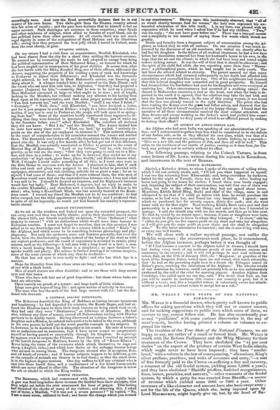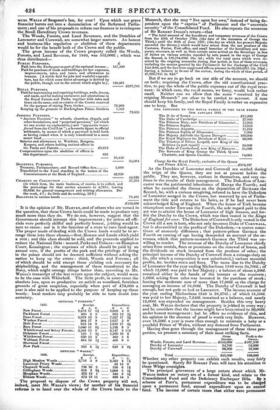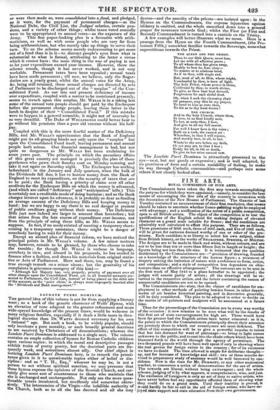MR. WELLS 8 TRUE STATE OF THE NATIONAL
FINANCES.
MR. WELLS is a financial doctor, who is pretty well known to public offices for asking questions which they will not or cannot answer, and for making suggestions to public men which some of them, we venture to say, cannot follow out. He has also occasionally pos- sessed "publicists" with some curious discoveries in the way of mare's-nests, besides having printed a volume or volumes to ex- pound his views.
The troubles of the True State of the National Finances we are happy to say, are rather of a small or formal kind. Mr. WELLS is wroth with the Reform Parliament and the Whig Ministry for their treatment of the Crown. They have abolished the "4i per cent duties" on the export of the produce of certain West India islands, which ought never to have been imposed; they have "annihi- lated," with a reform in the law of conveyancing, " alienations, King's silver prefines, postfines, and writs of covenant and entry,"—a sort of fees formerly paid to the Crown on suffering a fine and recovery, a remnant of the old feudal system, yielding some 7,000/. a year); and they have abolished "Sheriffs' proffers, forfeited recognizances, fines, issues, penalties, and estreats,' —other remnants of the feudal system, by which a petty fee was exacted from Sheriffs,—a source of revenue which yielded some 600/. or 700/. a year. Other revenues of a like character and amount have also been swept away; not for the life of the Queen, which she, being imposed upon by Lord MELBOURNE, might legally give up, but, by the head of SA. -mum WELLs of Sergeant's Inn, for ever I Upon which our grave financier bursts out into a denunciation of the Reformed Perlis- -ment ; and one of his proposals to reform our finances is to reimpose the Small Hereditary Crown revenues.
The Woods, Forests, and Land Revenues, and the Dutchies of Lancaster and Cornwall, are somewhat larger matters. An honest and business-like regulation or abolition of these departments would be for the benefit both of the Crown and the public.
The gross income of the Crown property called the Woods, Forests, and Land Revenue, for 1840, was 552,0001.; which was thus distributed- PUBLIC PURPOSES,
Paid into the Exchequer as part of the national income 167,500 Paid for purchase of lands and buildings, for law- expenses, improvements, rates, and taxes, and allowances to tenants. (A fertile field for jobs and wasteful expendi- ture, but for which some direct advantage is derived by the public, though not to the extent which might be) 120,281 REGAL PURPOSES, Paid for maintaining and repairing buildings, walls, fences, and roads, and for making enclosures and plantations in the Royal Forests and Parks, together with rates and taxes on the same, and on estates of the Crown reserved for the purpose of raising Navy timber Keeping up the grounds in Buckingham Palace Gardens JOBBING PURPOSES,
44Ancient Pensions" to schools, churches, chapels, and other foundations, and " perpetual pensions," (of which we can render no explanation,) and "payments trans- ferred from the Civil List "; a favourite figure in official arithmetic, by means of which a payment is held forth as having ceased when it is only transferred to a more
secret fund Salaries and allowances to Wardens, Rangers, Keepers, and others holding ancient offices in the Parks and Forests £9,619 Compensations upon the abolition of offices in this department 831 £552,338
It is the opinion of Mr. Heaver, and of others who are versed in The question, that these Crown lands could be made to produce very much more than they do. We do not, however, suggest that the Government should attempt this improvement ; for unless all offi- cials were perfectly skilful and perfectly honest, jobbing would be Imre to ensue: nor is it the function of a state to turn land-agent. The proper mode of dealing with the Crown lands would be to ar- range them into three classes,-first, Houses and Lands which yield a rent ; and this class should be sold, and the proceeds applied to reduce the National Debt : second, Parks and Palaces-as Hampton Court, Kensington ; the expenses of which should be paid by an annual vote, if the profits of the park and the privilege of living in the palace should not be deemed sufficient without asking the nation to keep up the estate : third, Woods and Forests ; all of which should be sold except those yielding oak necessary for shipbuilding, and the management of these transferred to the Navy, which might arrange things better than, according to Mr. WELLS'S transcript of the last return upon the subject, would seem to be the case with Whitehall. The little profit, in some cases the absolute loss, upon so productive an article as woodland, furnishes grounds of great suspicion especially when part of £78,000 a year is also said to be applied to the purpose of keeping up these woods: local readers may probably be able to turn doubt into certainty.
• •
OFFICIAL "WOODS."
1834. Receipt. Expenditure.
se s. a.
High Meadow Woods 2,716 2 8 2,560 4 71 Lanercost Priory Woods 32 15 0 Chopwell Woods 736 10 5 536 6 14
Gillingham Woods 819 2 91 1,008 5 51
Meopham Woods 376 12 1 545 6 5/ Elusion Woods 672 19 11 686 14 5
The proposal to dispose of the Crown property will not, indeed, meet Mr. WELLS'S views ; for another of his financial reforms is to hand over the whole of the Crown lands to the
DOUBTFUL PERPOSES, -
Treasury, Parliamentary, and Record Office fees 1,668 Transferred to the Fund standing in the names of the
Commissioners at the Bank of England 42,958 CHARGES OF COLLECTION (in which item, the main business, of course, is to collect, and the percentage for that service amounts to 4,7611., leaving 32,8241. for general management and retiring allowances. Do- the-work, 41; do-little and do-nothing, 321.)
BALANCES in various hands
78,269 1,562 13,634 10,450 £287,781 79,831 24,084 44,626 37,565 78,431
OFFICIAL "FORESTS."
18..V. Receipt. Expenditure.
X s. d. X a. d.
New Forest 9,676 17 64 8,603 4 0 Packhurst Forest 400 2 9 869 13 51 Dean Forest 9,079 10 9 7,327 17 3/ 'Windsor Forest 204 17 9 1,657 5 0 Bolt Forest 953 14 9 1,839 17 4/ Bete Forest 1,040 11 81 1,136 8 5 'Whittlewood and Salcey Forests.. 2,599 13 9 3,147 3 114 Delmore Forest 125 7 21 1,230 16 9 Whichwood Forest 630 13 2 460 3 6 Waltham Forest 664 19 11 969 9 8 Sherwood Forest
New Park 393 6 5/ 629 2 9/
Monarch, that she may " live upon her own," instead of being de- pendent upon the " caprice" of Parliament and the " uncertain security " of the Consolidated Fund. He also repeats the nonsense of Sir ROBERT INGLIS'S return-that " The total amount of the hereditary and temporary revenues of the Crown from the 25th of October 1760, (the date of the accession of George the Third,) until the 20th of June 1837, (the day on which her present Majesty ascended the throne,) which would have arisen from the net produce of the Customs, Excise, Post-office, and small branches of the hereditary and tem- porary revenues, as well as from certain sums settled on the Sovereign in lieu of duties on various articles repealed by acts passed in the reign of George the Second, is 116,784,8161. 18s. 5d.; while the total sums which were re- ceived by the reigning monarchs during that period, in lieu of these revenues, including the monies granted by the Parliament for the discharge of the Civil List debt, and the fees from suppressed offices, amount to 69,385,031/. 15s. 104c/.; leaving a balance in favour of the nation, during the whole of that period, of 47,399,7851. 2s. aid."
But if we are to go back on one side of the account, we should on both; requiring the Crown, after the old constitutional prac- tice, to pay the whole of the public expenses out of the royal reve- nues: in which case, the royal means, we fancy, would look rather small. Neither can we allow that the sums "received by the reigning Monarch" are alone to be carried to account. A man should keep his family, and the Royal Family is rather an expensive one to keep. See
THE ANNUITIES TO THE ROYAL FAMILY IN THE YEAR ENDED
5Ert JANUARY 1841.
The D.Jse of Sussex £21,000 The Duke of Cambridge 27.000
The Princess Mary, now Dutchess of Gloucester 15,29
8 The Princess Sophia
151,295168 The Princess Augusta •
The Princess Sophia of Gloucester 7,000
Her Majesty Adelaide the Queen Dowager • 100,000
Her Royal Highness the Dutchess of Kent. 30,000 The Trustees of Prince Leopold, now King of the Belgians (a part repaid) 50,000
The Duke of Cumberland, now King of Hanover 21,000
The Servants of King George the Third, Queen Charlotte, and Queen Caroline 14,065 Charge for the Royal Family, exclusive of the Queen and Prince Albert £313,197
As the Dutchies of Lancaster and Cornwall are settled during the reign of the Queen, they are not at present before the public. They are, however, curious in themselves, and very cu- rious in the results of their management. The Dukedom of Lan- caster was the patrimonial inheritance of lisic5r the Fourth; and when he ascended the throne on the deposition of RICBA.RD the Second, he, with a curious misgiving, refused to have the Dukedom of Lancaster merged in the Crown, but reserved by act of Parlia- ment the title and estates to his heirs, as if be had never been acknowledged King of England. When the house of York became triumphant under EDWARD the Fourth, the sole regard paid to this act was to attaint the house of Lancaster of high treason, and for- feit the Dutchy to the Crown, which was then vested in the Kings of England for ever. The Dukedom of Cornwall is only vested in the Crown till a son is born, who not only becomes Duke of CORNWALL, but is also entitled to the profits of the Dukedom,-a source some- times of unseemly difference ; that pattern-prince GEORGE the Fourth on coming of age having demanded an account of the re- venues, which that pattern-monarch GEORGE the Third was un- willing to render. The revenue of the Dutchy of Lancaster chiefly arises from rentals, fines or premiums on the renewal of leases, and the dividends on stock invested from the produce of sales ; the principal income of the Dutcby of Cornwall from a coinage-duty on tin, (for which a composition is now substituted,) various manorial profits, &c. besides rents and fines. The sums due to the Dutchy of Lancaster for the year ending Michaelmas 1840 were 34,700/. • of which 12,0001. was paid to her Majesty ; a balance of about 4,30d. remained either in the hands of the tenants or the receivers; 1,060/. arising from sales was invested in the purchase of stock ; leaving the moderate sum of more than 17,000/. as the charge for managing an income of 34,000/. The Dutchy of Cornwall is bad enough, but not quite so bad as Lancaster. The income account of the year ending Michaelmas 1840 is 38,3781.; of which 18,5001. was paid to her Majesty, 7,6401. remained as a balance, and nearly 12,000/. was expended on management. Besides this very heavy cost, Mr. WELLS declares that the property is jobbed in every way; and he considers that the income might have been raised to 90,000/. under honest management : but he offers no evidence of this, and his opinion in the absence of proof is worth very little. However, even 18,500/. a year is more than enough to maintain a baby or a youthful Prince of Wales, without any demand from Parliament.
Having thus gone through the management of these three pro- perties, we present a summary of their most striking facts.
Gross Prat to the Income. Owner.
Woods, Forests, and Land Revenue .....
£552,000 £167,500
Debby of Lancaster
34,700 12,000 Dutch,- of Cornwall 38,300 18,500 Total 625,000 198,000
Whether any other property can exhibit such results, may fairly be questioned. Surely Si? ROBERT PEEL will turn his attention to these Whigs oversights.
The principal grievances of a large nature about which Mr. WELLS makes an outcry are of a formal kind, and relate to the Consolidated Fund and the Deficiency Exchequer Bills. By scheme of Peres, permanent expenditure was to be charged upon a permanent fund, annual expenditure upon an annual fund. The income of certain taxes that either were permanent or were then made so, were consolidated into a fund, and pledged, as it were, for the payment of permanent charges—as the National Debt, the Civil List, the Judges' salaries, certain pen- sions, and a variety of other things ; whilst taxes voted annually were to be appropriated to annual votes—as the expenses of the Army. This fine paper-looking plan is a favourite with arith- meticians, as well as with some people who are very far from being arithmeticians, but who merely take up things to serve their turn. To us the scheme seems merely endeavouring to get more out of a fund than is in it—to distract people's eyes from what is substantial to what is formal, attributing to the latter a virtue which it cannot have : the main thing in the way of paying is not to let your expenditure exceed your income. However, there the scheme stands, though it has never worked, and is not very workable. Permanent taxes have been repealed ; annual taxes have been made permanent ; till now, we believe, only the Sugar- duties are a yearly grant, whilst the annual votes for the Army, &c. being still retained, these annual charges are directed by acts of Parliament to be discharged out of the "surplus" of the Con- aolidated Fund. As our late and present deficiency of income over expenditure, coupled with a matter to be mentioned presently, seems to trench upon this surplus, Mr. WELLS is in a taking lest some of the annual vote people should get paid by the Exchequer before the permanent charge people, leaving these latter in the lurch in despite of their Consolidated Fund." If this mistake were to happen in a general scramble, it might not of necessity be so very dreadful. The Duke of WELLINGTON could better bear to go without his pensions than a poor old veteran without his half- pay. Coupled with this is the more fearful matter of the Deficiency Bills, and Mr. Wati.s's apprehension that the Bank of England might put its all-grasping hands not only upon the " surplus ' but upon the Consolidated Fund itself, leaving permanent and annual people both minus. Our financial management is bad, but not quite so dangerous as Mr. WELLS has been exclaiming for some years past. The principle on which the pecuniary affairs of this great country are managed is precisely the plan of those gentlemen who pawn their Sunday coat on Monday morning and take it out again on Saturday night. The Exchequer has nothing beforehand: in the January and July quarters, when the bulk of the Dividends fall due, it has to borrow money from the Bank of England to meet its expenditure, on the security of taxes that are to be paid ; the Bank having a priority of claim over all other creditors for the Exchequer Bills on which the money is advanced, (and which are called" deficiency" and "anticipation" bills.) This is certainly not a creditable mode of doing business ; and as the Bank charges interest upon its advances, it is probably as dear as funding an average amount of the Deficiency Bills and keeping money in hand: but we are happy to say there is no real danger at present of public. creditors going without their money. The Deficiency Bills just now indeed are larger in amount than heretofore ; but that arises from the late excess of expenditure over income, not from the principle of using these bills, as Mr. WELLS seems to suppose. In fact, if no mode existed of meeting a temporary short- coming by a temporary assistance, there might be a danger of somebody having to wait for their money. Except an absurd plan of financial reform, we have noticed the principal points in Mr. WELLS'S volume. A few minor matters may, however, remain to be gleaned, by those who choose to take the trouble; for though Mr. WELLS is verbose in language, crotchety in view, and absurd in his proposals, he has moiled in finance after a fashion, and draws his materials from original statis- tics or Acts of Parliament. Here and there, too, may be found a true enough remark on a minor abuse; but the generality of his complaints is grievance-mongery of this kind- " Although her Majesty has, very properly, priority of payment over all other charges upon the Consolidated Fund, yet in all financial accounts pre- sented to Parliament, the Civil List, instead of being placed on the debit side of the account, as the prior claim,' is always most improperly inserted after the 'Dividends and Bank management.'"




























 Previous page
Previous page